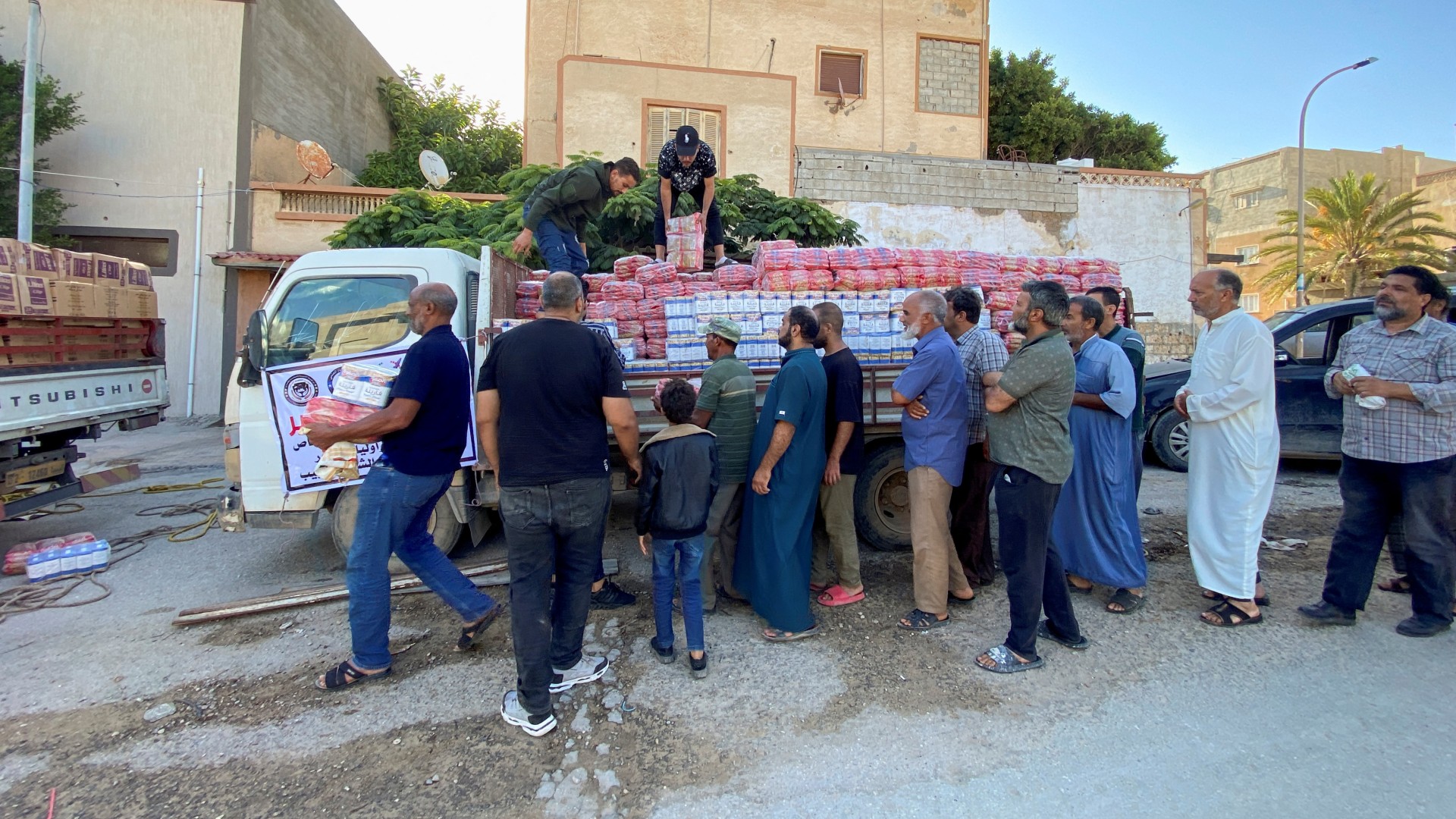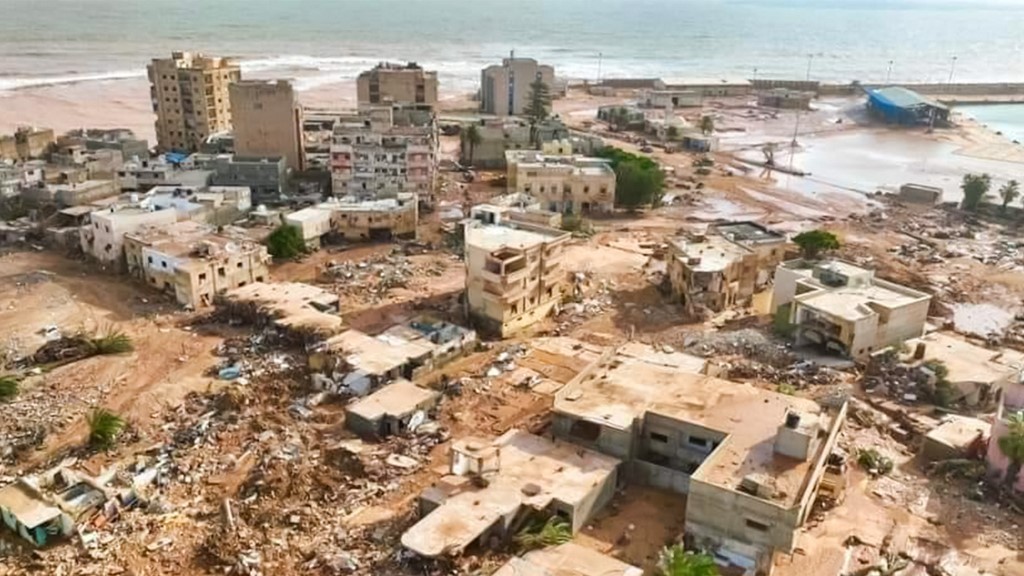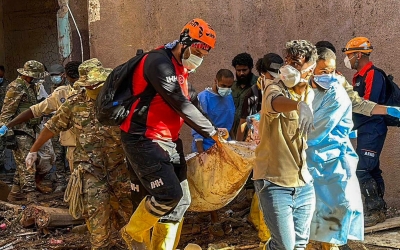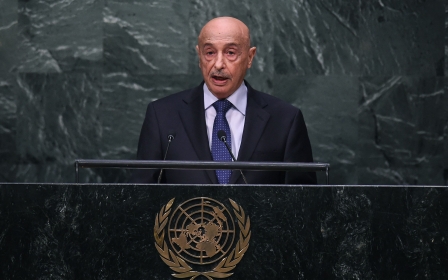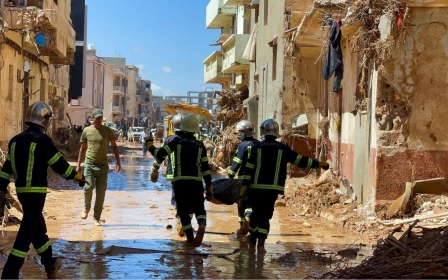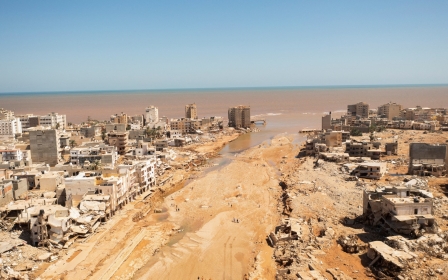Libya floods: Aid workers struggle to cope with magnitude of disaster
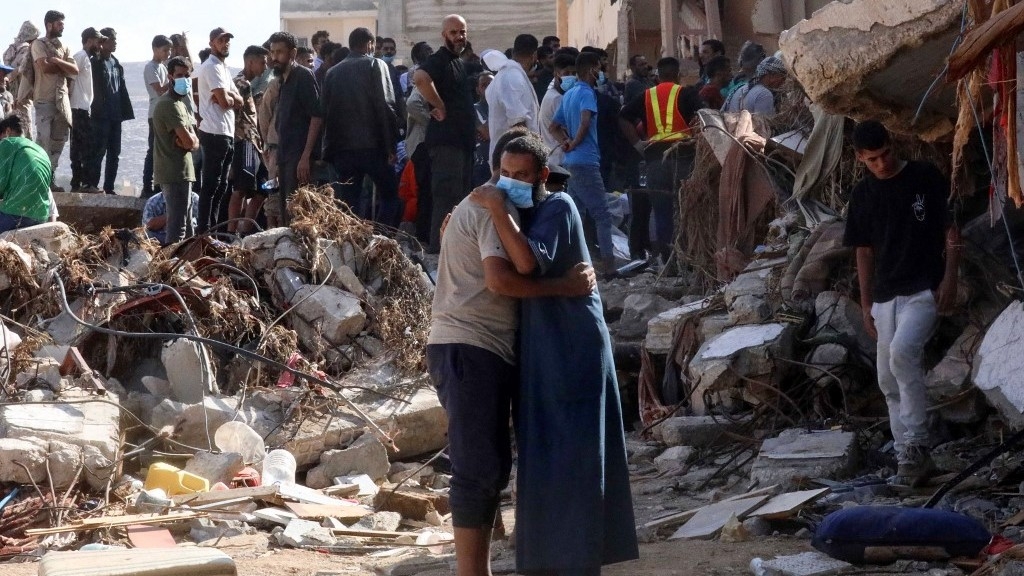
Aid workers and activists on the ground in Libya say that little aid has been received in the country even five days after devastating floods that killed and displaced thousands of people.
The tragedy began on Sunday night when two dams collapsed near Derna in eastern Libya, following Storm Daniel.
The storm unleashed floods down the Wadi Derna, a river running from the Green Mountains through the city and into the sea.
Libya's Red Crescent said that the death toll in the worst-hit city, Derna, has increased rapidly to 11,300.
Entire neighbourhoods were swept away and around 10,000 people are still missing.
While emergency response efforts have started, and international teams have been deployed, aid workers on the ground say much more support is needed.
Bashir Omar, a spokesperson for the Red Cross in Libya, said that the top priority has been removing the huge number of dead bodies that have been washed up around the city.
“We have around 400 volunteers who are working with us and are focused just on removing the dead bodies. The humanitarian situation is very difficult and people are in desperate need of help,” he told Middle East Eye.
“The magnitude of the needs are huge and we need time to assess how many deaths there are and how many homes have been destroyed,” he added, pointing out that the number of deaths and missing people is expected to be much higher than official records are stating.
According to one activist who spoke to Middle East Eye on condition of anonymity, there are currently no proper plans in place to count the fatalities, due to the scale of destruction.
“They spray numbers and the names of the dead on walls and photograph them so as not to forget, but there is no proper data entry or enough data collectors in the field right now,” he said.
'They spray numbers and the names of the dead on walls… but there is no proper data entry or enough data collectors in the field right now'
- Libyan activist
Amna Khalid al-Ameen, a 23-year-old medical student currently in Tobruk, east of Derna, says that the situation on the ground is critical, and families have been completely disconnected from each other.
“People here have only received water aid and have no food. Some are saying they are starving to death and there are no health services and no supplies,” she told MEE.
“Aid workers are busy collecting the corpses and saving people from under the ruins, but the dead bodies are starting to decompose and it’s getting dangerous for people who haven’t been able to leave the city,” she added.
Ameen says she has not been able to call her family due to poor connectivity and phone service, and explained that they have not been instructed to evacuate, so people are in their homes, too afraid to leave.
'Very little aid has arrived'
One of the key challenges aid workers are facing is getting access to those in need.
According to Omar, delivering aid to people has not been a straightforward process.
“It is increasingly difficult for us to get aid to people because of the roads being cut off, and the connection lines, and the lack of internet and electricity,” he said.
“It is hard to find out how many people are dead in the storm right now because of the situation. Teams are still rescuing people, and we’ll only know when they finish this process.”
Aid workers say that despite some aid trickling in, there is not nearly enough to cater for the many needs of the people affected.
“As of today, some aid has reached the western part of Derna, but very little has arrived in eastern Derna. There is a lot of hunger and dehydration to extreme levels. Some aid has arrived, it is just not being distributed properly,” says Wael Habil, a Dera-based volunteer and translator.
“Clothing is another huge issue. People have no form of clothing, it is just a catastrophe… women, children and men have no clothing whatsoever. Even shoes are important, as people are walking barefoot,” he added.
According to Habil, most families are yet to receive any aid packages, including food. Even rescue teams, he says, aren’t equipped with essentials such as protective face masks, overalls and other tools.
'Authorities and officials are not giving permission for civilians to help, which is one of the biggest challenges right now'
- Wael Habil, volunteer
“Authorities and officials are not giving permission for civilians to help, which is one of the biggest challenges right now. Civilians have tried to lead small groups to help people in remote areas and distribute food and packages, but they have not allowed us to,” he said.
Others reaffirmed that the needs on the ground are growing and people have no access to basic necessities such as food, water and clothing.
Children and women are some of the worst affected in the disaster, with no access to sanitary or hygiene products.
Ali Ghazali, a civil activist based in Derna, told MEE that one of the biggest issues on the ground is that people have very little access to medication, some of which is vital to their survival.
“The death count is growing day by day. The needs right now are everything. People left their homes with just the clothes on their backs. People are not getting any medicine, even important medications such as insulin,” he explained.
Some aid workers have also complained that teams are being harassed and pushed back by armed forces, which has disrupted the aid process.
Dr Haida al-Sherif, a Derna-based doctor, said that there is a large number of volunteers who have gathered to support survivors on the ground, but the process has not been smooth.
“The army is trying to control the amount of volunteers and is trying to organise matters, to make sure that those who are experienced and are experts are at the forefront. The disaster has left everyone over Libya terrified; communication is almost non-existent here,” she said.
“People are trying to evacuate Derna as soon as possible, because it is turning into a plague site due to the amount of dead bodies,” she added.
Activists who spoke to MEE also raised concerns over the spread of disease, as medical personnel on the ground have limited equipment and do not have enough resources to change their clothes, resulting in further infections.
“People have gone five days without changing any of their clothes and are handling all sorts of things, the situation is so bad,” said Habil.
People on the ground are saying that body bags are running out.
The International Committee of the Red Cross is set to deliver 5,000 bags, while the Turkish Red Crescent has brought 1,500.
Bodies are being transported in trucks from the city centre to areas like Dahr al-Hamar, south of the city, and Martouba, where thousands of city residents have been interred. The rescue, recovery, assessment and aid teams are struggling with limited resources.
Middle East Eye propose une couverture et une analyse indépendantes et incomparables du Moyen-Orient, de l’Afrique du Nord et d’autres régions du monde. Pour en savoir plus sur la reprise de ce contenu et les frais qui s’appliquent, veuillez remplir ce formulaire [en anglais]. Pour en savoir plus sur MEE, cliquez ici [en anglais].


